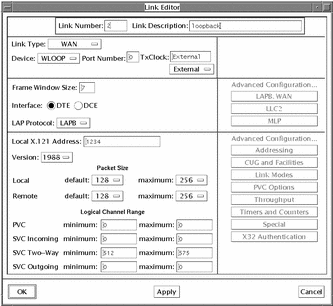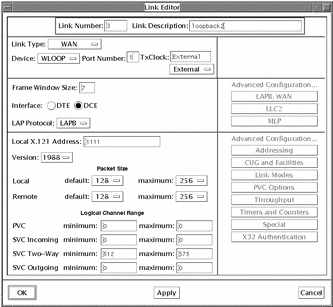Setting up a Loopback Configuration
A loopback configuration is useful for testing and troubleshooting your local configuration down to, and including, the link layer. Completing a call over a loopback interface is a useful check of your local X.25 and link layer configuration. If you have problems bringing up the X.25 network, a loopback test should be one of the first tests you perform.
Follow the instructions in "Loopback over a WAN (LAPB)" to configure a loopback over LAPB and in "Loopback over LLC2 (LAN Links)" to configure a loopback over LLC2.
Loopback over a WAN (LAPB)
For a loopback configuration over LAPB, you must have two links. Configure these as follows:
-
Display the Link Editor window.
In the x25tool base window, click on Add and select the default template.
-
Create the first loopback link by assigning the values shown below:
-
A unique link number
-
WAN as the link type
-
WLOOP as the device type
-
0 as the port number
-
Interface type as DTE
-
LAP protocol to LAPB
-
Any string of digits as the address
Figure 8-1 Creating the First Link in the Loopback Configuration

-
-
Click on OK to apply the changes and to dismiss the window.
-
Create a second link.
Configure the values as shown below:
-
A unique link number
-
WAN as the link type
-
WLOOP as the device type
-
1 as the port number
-
Interface type as DCE
-
LAP protocol to LAPB
-
Any string of digits as the address
Figure 8-2 Creating the Second Link in the Loopback Configuration

-
-
Click on OK to apply the changes and to dismiss the Link Editor.
-
Save the changes to the configuration.
From the x25tool menu, select File => Save.
-
Stop and restart your X.25 network.
From the Network menu in x25tool, select Stop X.25 Network and Start X.25 Network.
At this point, you have a usable loopback interface for LAPB. You can test it with a command such as the one below. In this example, you have a loopback interface on link 2 with a Remote Address of 1111:
% pad 2.1111 Break-in sequence is `^Pa' Connecting... Connected Solstice X.29 Terminal Service login:
You can connect to the other member of the link pair by specifying its link number and its Local Address. For example:
% pad 3.1234 Break-in sequence is `^Pa' Connecting... Connected Solstice X.29 Terminal Service login:
It is convenient to set up entries for your loopback interfaces in your PAD hosts database. See "Configuring the PAD Hosts Database" for instructions. In the PAD Hosts Database window, you need enter values only for the Host Name, Remote Address, and Link Number parameters.
You can run x25trace in another window and observe LAPB and X.25 Packet Layer activity over the loopback interface. To do this, open another window, log on as root and type:
# /opt/SUNWconn/bin/x25trace -i /dev/lapb
See "Obtaining Packet and Link-Level Traces" for instructions on the use of x25trace.
Loopback over LLC2 (LAN Links)
The LLC2 layer supports loopback by default, using the loopback SAP of 70. To test a loopback connection over LLC2, simply specify your LLC2 link number, MAC address, and SAP address of 70 as arguments to the pad program. For example, if your LLC2 link number is 1 and your MAC (Ethernet) address is 8:0:20:ab:21:6, enter:
% pad 1.080020ab210670 Break-in sequence is `^Pa' Connecting... Connected Solstice X.29 Terminal Service login: |
You can also set up entries for your LLC2 loopback interface in your PAD hosts database. See "Configuring the PAD Hosts Database" for instructions. In the PAD Hosts Database window, you need enter values only for the Host Name, Remote Address (your MAC address plus 70), and Link Number parameters.
To observe LLC2 protocol activity over the loopback interface, you can, as root, enter an x25trace command such as:
# /opt/SUNWconn/bin/x25trace -i /dev/llc2 |
See "Obtaining Packet and Link-Level Traces" for instructions on the use of x25trace.
- © 2010, Oracle Corporation and/or its affiliates
